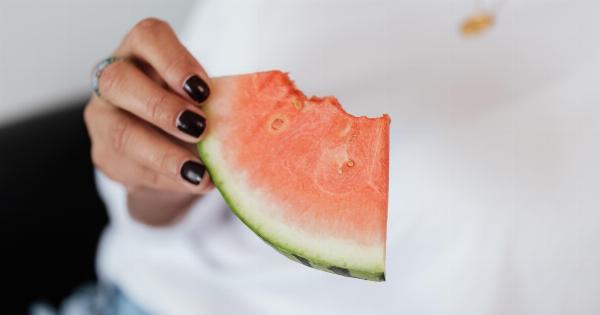Watermelon is a fruit that is not only delicious and refreshing, but also packed with numerous health benefits.
This juicy fruit is adored the world over for its sweet and refreshing taste, and many of us look forward to indulging in watermelon during the summer months when it is in season.
The Origin of Watermelon
Watermelon is believed to have originated in Africa, specifically in the Kalahari Desert. The fruit provided a vital source of water for nomads who roamed the desert, as it is made up of 92% water.
Over time, watermelon spread to different parts of the world, such as Egypt, where the fruit was often left in the tombs of Pharaohs as a source of refreshment in the afterlife.
The Nutritional Value of Watermelon
Watermelon is a low calorie fruit and is high in vitamins A and C, which are essential for maintaining a healthy body.
In addition, watermelon is a good source of potassium, which helps regulate the body’s blood pressure and keeps the heart healthy. The fruit also contains lycopene, an antioxidant that is believed to lower the risk of certain cancers.
Watermelon and Hydration
As mentioned earlier, watermelon is made up of 92% water, making it an excellent natural source of hydration. This is especially beneficial during the hotter months of the year when the body is at a higher risk of dehydration.
Consuming watermelon can replenish the body’s fluids and help prevent dehydration.
Watermelon and Weight Loss
Due to its low calorie content and high water content, watermelon is a great fruit to include in a weight loss diet. A cup of diced watermelon is just 46 calories, making it a great snacking option for those trying to lose weight.
In addition, the fruit is high in fiber, which helps keep hunger pangs at bay and prevents overeating.
How to Choose a Ripe Watermelon
Choosing a ripe watermelon is crucial to enjoying the fruit’s sweet flavor. Here are some tips on how to choose a ripe watermelon:.
- Look for a uniform shape. A watermelon that has uneven sides is likely not ripe.
- Check the field spot. The field spot is the area where the watermelon was resting on the ground. A ripe watermelon will have a creamy yellow spot.
- Tap the watermelon. A ripe watermelon will have a hollow sound when tapped.
Watermelon Recipes
Watermelon is a versatile fruit that can be used in a variety of recipes. Here are some mouth-watering watermelon recipes to try:.
Watermelon Salad
Ingredients:.
- 4 cups diced watermelon
- 1 cup diced cucumber
- 1/4 cup chopped fresh mint
- 1/4 cup crumbled feta cheese
- 1 tbsp olive oil
- 1 tbsp red wine vinegar
- Salt and pepper to taste
Directions:.
- In a large bowl, combine the watermelon, cucumber, mint, and feta cheese.
- In a separate bowl, whisk together the olive oil, red wine vinegar, salt, and pepper.
- Drizzle the dressing over the watermelon salad and toss to combine.
- Serve immediately.
Watermelon Sorbet
Ingredients:.
- 4 cups diced watermelon
- 1/4 cup honey
- 1/4 cup lime juice
- 1/2 cup water
Directions:.
- Puree the watermelon in a blender until smooth.
- In a small pot, combine the honey, lime juice, and water. Cook over medium heat, stirring occasionally, until the honey is fully dissolved.
- Add the honey mixture to the blender with the watermelon and blend until fully combined.
- Pour the mixture into a shallow dish and freeze for 4 to 6 hours, stirring occasionally, until frozen.
- When ready to serve, scoop the sorbet into bowls and enjoy!
Conclusion
Watermelon is a delicious and nutritious fruit that is perfect for summer snacking. Whether you decide to enjoy it on its own or incorporate it into recipes, watermelon is sure to please.
With its high water content and low calorie count, it’s the perfect snack for those looking to stay hydrated and maintain a healthy weight.



























